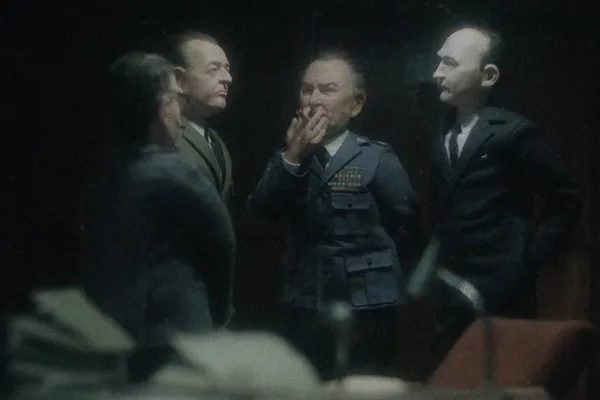Eye For Film >> Movies >> 1970 (2021) Film Review
1970
Reviewed by: Amber Wilkinson

Including re-enactment in documentaries can be a tricky business - not just because actors so often seem like a pale facsimile of the original but also, particularly in the case of historical films, because the look of the period in question can be so difficult to recreate. Tomasz Wolski comes up with a neat and imaginative solution for his latest documentary, using animator Robert Sowa's stop-motion puppets to accompany audio of telephone conversations that were recorded between Polish apparatchiks during protests in the country in the run-up to Christmas 1970.
By creating a little microcosm of the world via the puppetry, it's much easier for Wolski to keep a grip on the mood, as these grey men in their grey offices - each recreated in fine detail - chat back and forth while cigarette smoke curls about them. The sound design, with drumming fingers and flipping light switches, along with a brooding score from Bartlomiej Tycinski and DJ Lenar adds to the airless mood of a film which took home a Special Jury Prize at Visions du Réel. The very word "puppet", of course, also carries with it a connotation of being operated from beyond, which plays into the sense of the Party machine in operation here as tensions escalate. It doesn't matter that we don't know them by name, although they are briefly introduced, in a sense they could be anyone given their role in a system whose purpose was to quash revolution at almost any cost.
The stop-motion exchanges are interspersed with grainy black and black and white footage - also chiefly shot by security forces - first of workers, who were protesting over spiralling inflation and stagnant wages, with their placards, gradually giving way to larger crowds and unrest until fires are started and bullets fired. There's a chilling matter-of-factness to the way the men discuss flying in propaganda leaflets and chemical weapons or the manner in which they consider whether someone from the Finnish embassy should have "a car accident" on the way to the airport, in case they happen to have photos of the protests that could be leaked to the outside world. There's also irony in the way that one speaks to another with a mouthful of bread, that most simple of things and one which most on the streets are calling for.
They are not shown to be completely without morals, trying to save their own with some vim after a fire is started - but the flipside of that is the willingness to open fire on the populace, something that resulted in a grim death toll of 41, spanning ages from 15 to 79 and for which justice would barely be served cold decades later. It could be argued that those who are protesting seem to be stripped of their voice - although the footage of indiscriminate, brutal arrests, with each being forced to look at the security camera speaks volumes. It is also, perhaps, part of the point, in emphasising just how far removed those little grey men were from the wider world and yet simultaneously how easily they could wield the power of life or death.
Reviewed on: 27 Apr 2021















